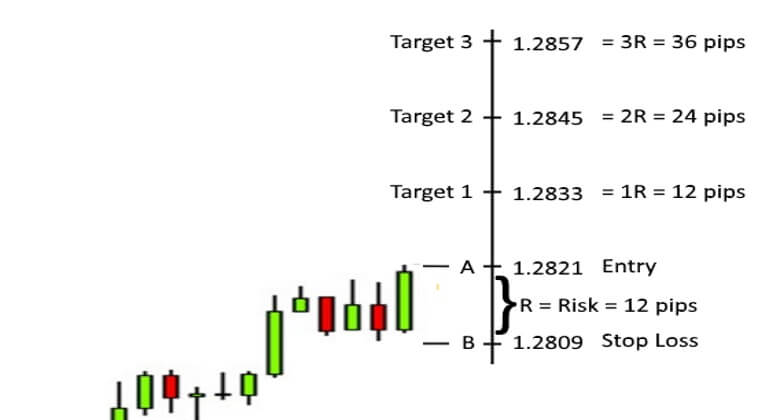Risk Management for Traders – Part two

If the expectancy is negative, the strategy will lose money over time. Many traders use strategies with negative expectancy because they simply do not know how to calculate it.
The expectancy of a trade or a series of trades is a combination of the risk to reward ratio and the win/loss ratio:
Reward to risk = expected gain/amount risked
Win and Loss Ratios = expected percentage of winning trades and losing trades
Expectancy = (Reward to Risk Ratio x Win percentage) – loss percentage
An Example

The above example represents a bull flag on GBPUSD. A buy is executed at A and a stop loss is placed at point B, just below the lowest level of the flag. That means a losing trade would result in a loss of 12 pips, which we can refer to as R (for risk).
If Target 1 was hit it would imply a profit of 12 pips or 1R. The reward to risk ratio is therefore 1:1.
If the win percentage was 60%, the loss percentage would be 100% -40% = 40%.
And, the expectancy would be (0.6*1) -0.4 = 0.2.
That means the average profit for every $100 risked would be $20.
Target 2 would imply a profit of 24 pips or 2R. The reward to risk ratio at T2 is therefore 2:1.
If the win percentage was 45%, the loss percentage would be 100% – 45% = 55%.
The expectancy would therefore be (0.45*2) -0.55 = 0.35.
That means the average profit for every $100 risked would be $35.
Notice that in the second case, even though the strategy had more losing trades than winning trades, it was profitable because the winners were twice the size of the losers.
The following table will give you an idea of the expectancy that results from a range of reward to risk and win rate combinations. Note that all the expectancies in red are negative – trading a strategy with those ratios implies trading a system that is expected to lose money over time.
Reward to Risk Ratio
| Win Rate | 3:1 | 2:1 | 1:1 | 0.5:1 |
| 70% | 1.8 | 1.1 | 0.4 | 0.05 |
| 60% | 1.4 | 0.8 | 0.2 | -0.1 |
| 50% | 1 | 0.5 | – | -0.25 |
| 40% | 0.6 | 0.2 | -0.2 | -0.4 |
| 30% | 0.2 | -0.1 | -0.4 | -0.55 |
| 20% | -0.2 | -0.4 | -0.6 | -0.7 |
While we can never know the exact win rate that will be achieved in the future, backtesting a strategy can give us a fairly good idea.
Trading on margin is high risk.

